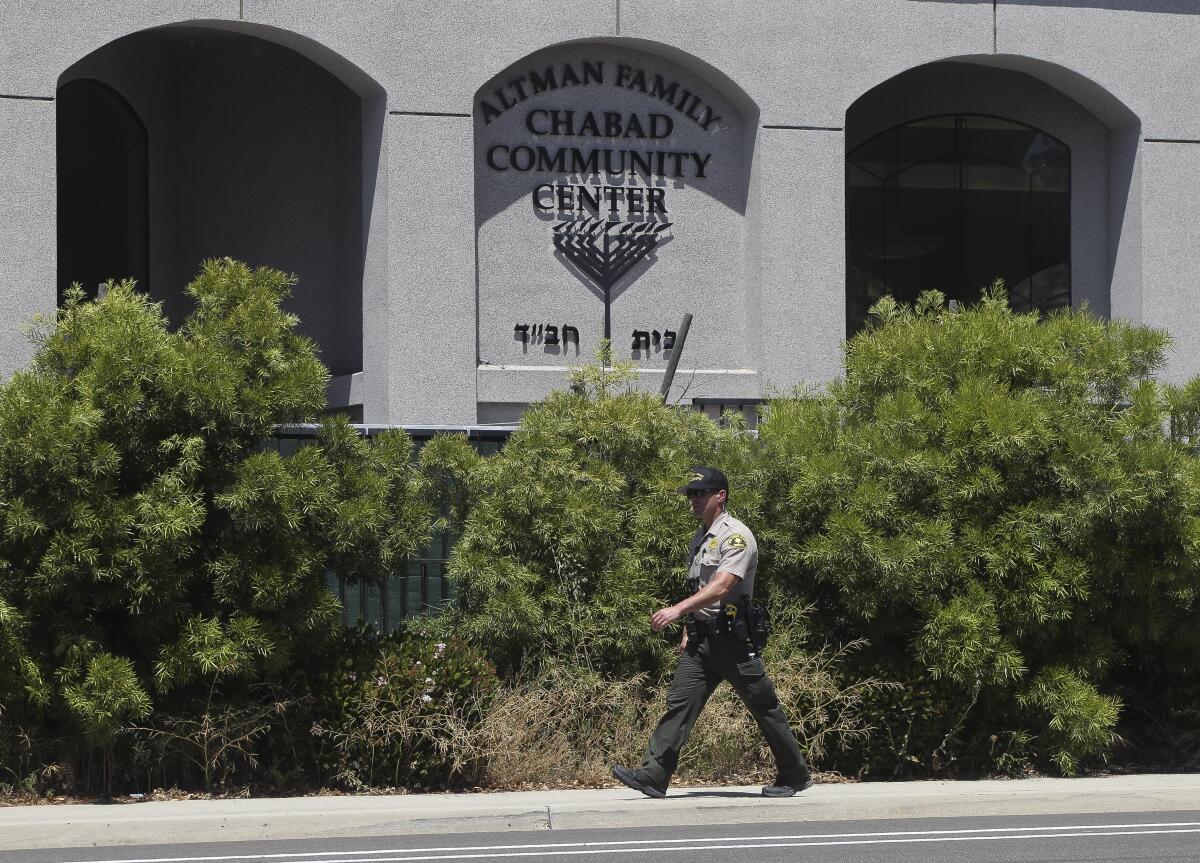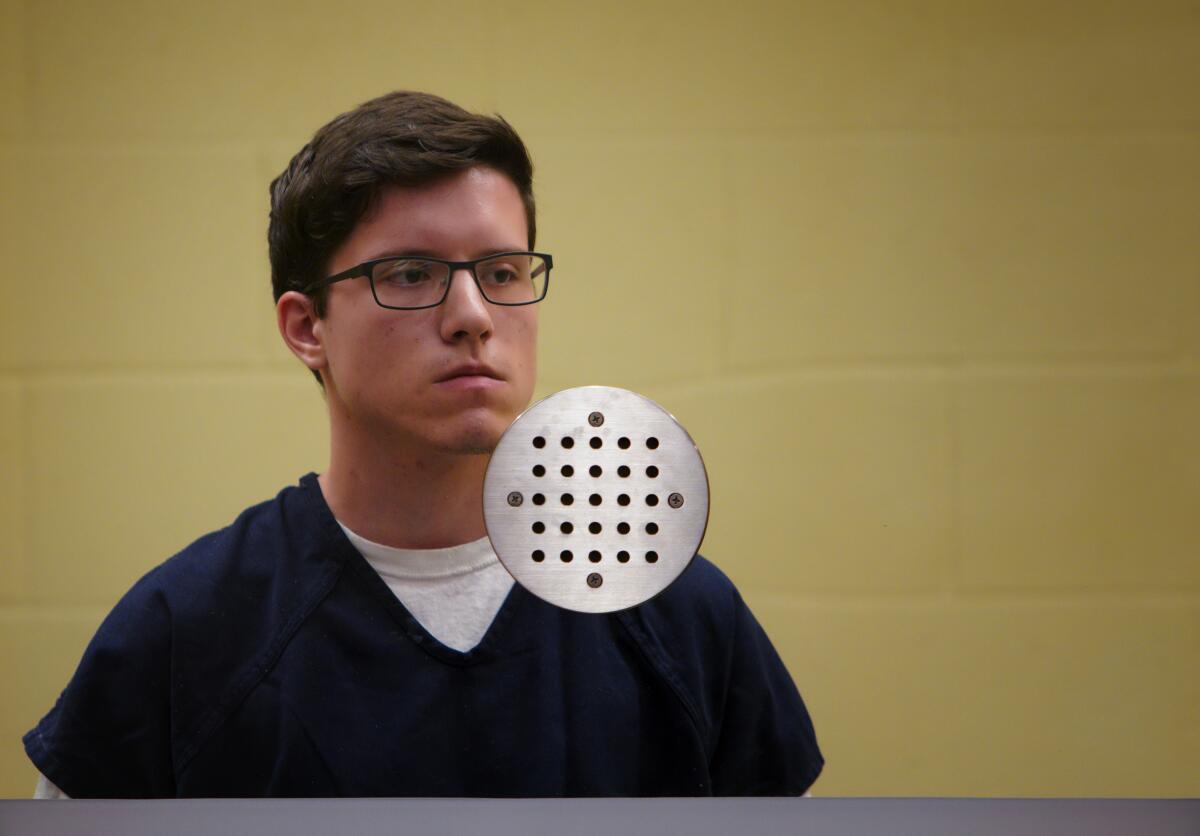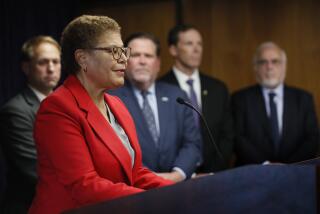Poway synagogue shooter, 22, pleads guilty to murder and attempted murder

A former university student pleaded guilty in San Diego Superior Court on Tuesday to shooting congregants at a Poway, Calif., synagogue during a Passover service in 2019, killing one person and injuring three others, including a child.
John T. Earnest, now 22, was charged with murder and attempted murder and pleaded guilty in a deal that spared him a potential death sentence. He was also charged with arson and admitted setting fire to an Escondido, Calif., mosque a month before the attack on the synagogue, and that both acts were hate crimes.
As a result of his plea, Earnest will be sentenced to life in prison without the possibility of parole, plus 121 years to life and another 16 years.
He is scheduled to be sentenced Sept. 30 in San Diego Superior Court.
In addition to the case the district attorney’s office brought in state court, Earnest was indicted in federal court, where he is facing hate crime charges and more.

Earnest has signed a conditional plea agreement in the federal prosecution that has been submitted to the office of U.S. Atty. Gen. Merrick Garland, attorneys said in early June. The terms of that plea offer have not been disclosed, nor have attorneys said publicly if those terms have been accepted.
The federal case had stalled over the past year as the court awaited a decision on whether the Department of Justice would be seeking the death penalty. A decision has not been disclosed publicly but has likely been mitigated by the offer to plead guilty. Federal prosecutors have until Aug. 30 to let the judge know if they plan to seek execution, and Earnest is due back in federal court in early September.
The proposed plea deal in the federal case prompted prosecutors in the state case to accept a guilty plea to avoid double jeopardy, San Diego County Deputy Dist. Atty. Leonard Trinh said after Tuesday’s hearing.
“It was important that he be held accountable in state court for his crimes,” Trinh said, “and that conditional plea could have interfered with our ability to prosecute him once that plea is entered in federal court.”
He said state law prohibited further prosecution of an individual who had already been prosecuted for the same conduct in another court.
Earnest’s parents left the court without making comment to reporters, as did his defense attorney, John O’Connell. The family of slain congregant Lori Gilbert-Kaye also left without comment.
The San Diego County district attorney’s office released a statement saying that although prosecutors had reserved the option of pursing the death penalty, life in prison without the possibility of parole was “an appropriate resolution to this violent hate crime.”
The statement said the decision to accept a plea deal “was made in the interest of justice and with the knowledge that a parallel prosecution by the U.S. Attorney’s Office and possible plea in that case would prevent the state’s case from moving forward.”
“This plea ensures the defendant is held accountable for his crimes under California state law,” the statement read.
Earnest was a 19-year-old resident of the San Diego suburb of Rancho Peñasquitos and a Cal State San Marcos nursing student when he walked into the synagogue in sunglasses, a military-style tactical vest and carrying an AR-15-style rifle.
There were 54 people inside the synagogue when he started shooting on April 27, 2019. Chabad of Poway congregant Lori Gilbert-Kaye, 60, was killed. Founding Rabbi Yisroel Goldstein, 8-year-old Noya Dahan, and her uncle, Almog Peretz, 34, were injured.
Earnest fled when an off-duty Border Patrol agent fired at him.
As Earnest drove off, he called 911 and confessed to the shooting. He then waited for police to arrest him.
Shortly before the attack, Earnest posted an “open letter,” an online screed of racist and antisemitic statements and saying the “European race” must be protected. He also praised the March 2019 mass shootings at New Zealand synagogues, attacks that left 51 people dead.
A month before the shooting, Gov. Gavin Newsom signed an executive order putting a moratorium on the use of the death penalty in California, and closed the execution chamber at San Quentin State Prison. His orders remain in effect as long as he is in office, but prosecutors may still seek capital punishment, as happened in Earnest’s case.
San Diego Union-Tribune staff writer Kristina Davis contributed to this report.
More to Read
Sign up for Essential California
The most important California stories and recommendations in your inbox every morning.
You may occasionally receive promotional content from the Los Angeles Times.











